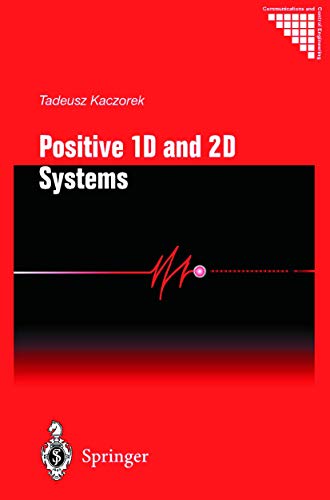Articoli correlati a Positive 1d and 2d Systems

Moving on from earlier stochastic and robust control paradigms, this book introduces the reader to the fundamentals of probabilistic methods in the analysis and design of uncertain systems. It significantly reduces the computational cost of high-quality control and the complexity of the algorithms involved.
Le informazioni nella sezione "Riassunto" possono far riferimento a edizioni diverse di questo titolo.
Le informazioni nella sezione "Su questo libro" possono far riferimento a edizioni diverse di questo titolo.
- EditoreSpringer Nature
- Data di pubblicazione2012
- ISBN 10 1447110978
- ISBN 13 9781447110972
- RilegaturaCopertina flessibile
- Numero di pagine444
Compra nuovo
Scopri di più su questo articolo
Spese di spedizione:
GRATIS
In U.S.A.
I migliori risultati di ricerca su AbeBooks
Positive 1D and 2D Systems (Communications and Control Engineering) by Kaczorek, Tadeusz [Paperback ]
Descrizione libro Soft Cover. Condizione: new. Codice articolo 9781447110972
Positive 1D and 2D Systems (Communications and Control Engineering)
Descrizione libro Condizione: New. Codice articolo ABLIING23Mar2411530316114
Positive 1D and 2D Systems
Print on DemandDescrizione libro Condizione: New. PRINT ON DEMAND Book; New; Fast Shipping from the UK. No. book. Codice articolo ria9781447110972_lsuk
Positive 1D and 2D Systems
Descrizione libro Taschenbuch. Condizione: Neu. This item is printed on demand - it takes 3-4 days longer - Neuware -Moving on from earlier stochastic and robust control paradigms, this book introduces the reader to the fundamentals of probabilistic methods in the analysis and design of uncertain systems. It significantly reduces the computational cost of high-quality control and the complexity of the algorithms involved. 448 pp. Englisch. Codice articolo 9781447110972
Positive 1D and 2D Systems
Descrizione libro Paperback / softback. Condizione: New. This item is printed on demand. New copy - Usually dispatched within 5-9 working days. Codice articolo C9781447110972
Positive 1D and 2D Systems
Descrizione libro Taschenbuch. Condizione: Neu. Druck auf Anfrage Neuware - Printed after ordering - In the last decade a dynamic development in positive systems has been observed. Roughly speaking, positive systems are systems whose inputs, state variables and outputs take only nonnegative values. Examples of positive systems are industrial processes involving chemical reactors, heat exchangers and distillation columns, storage systems, compartmental systems, water and atmospheric pollution models. A variety of models having positive linear system behaviour can be found in engineering, management science, economics, social sciences, biology and medicine, etc. The basic mathematical tools for analysis and synthesis of linear systems are linear spaces and the theory of linear operators. Positive linear systems are defined on cones and not on linear spaces. This is why the theory of positive systems is more complicated and less advanced. The theory of positive systems has some elements in common with theories of linear and non-linear systems. Schematically the relationship between the theories of linear, non-linear and positive systems is shown in the following figure Figure 1. Codice articolo 9781447110972
Positive 1D and 2D Systems
Descrizione libro Condizione: New. Dieser Artikel ist ein Print on Demand Artikel und wird nach Ihrer Bestellung fuer Sie gedruckt. Will give the reader tools for dealing with uncertainty in control systems which are more advanced and flexible than either traditional optimal control or robust control. Reduces the computational cost of high-quality control and the complexity of the algor. Codice articolo 4183980

